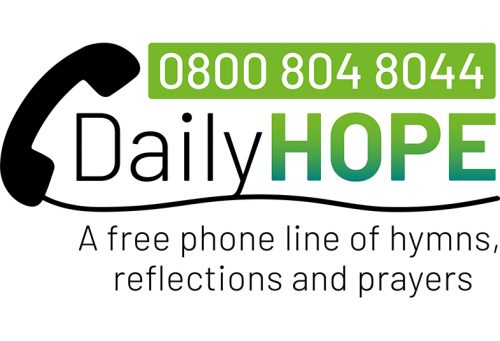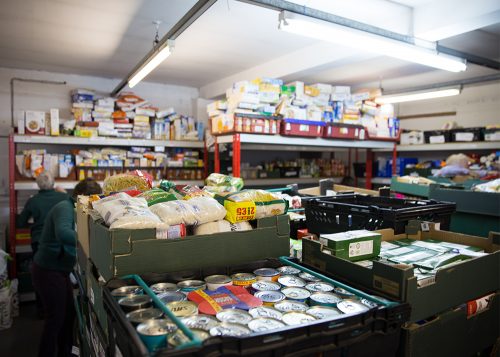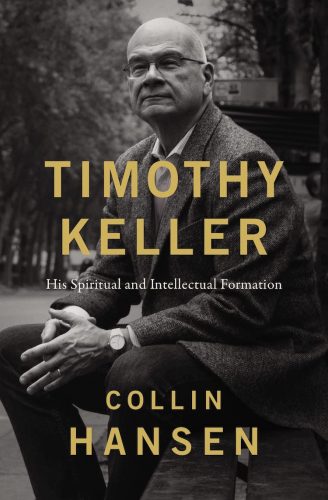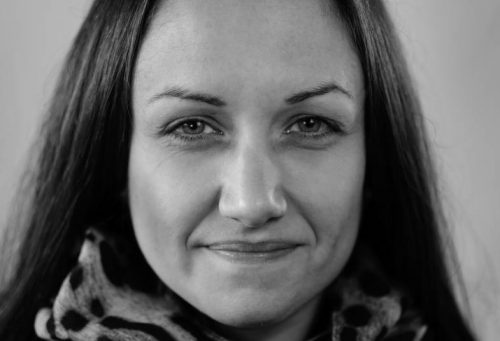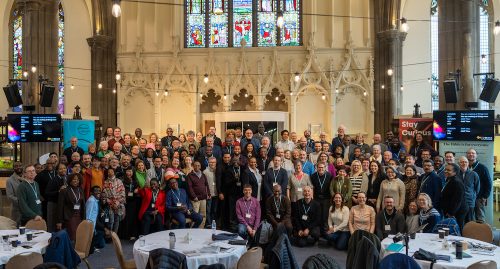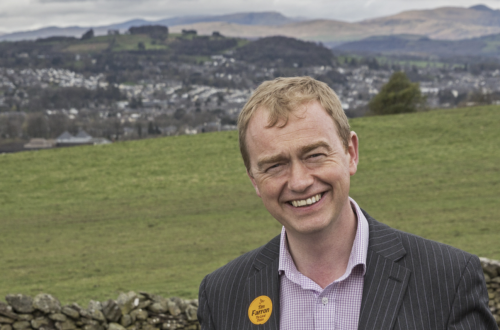 John Woods talks to MP and former Lib-Dem leader Tim Farron about politics, his faith and his book A Mucky Business: why Christians should get involved in politics
John Woods talks to MP and former Lib-Dem leader Tim Farron about politics, his faith and his book A Mucky Business: why Christians should get involved in politics
I was pleasantly surprised that the book was so Christian:your Christian faith is clearly integral to this book; why is this important to you?
Yes, it is deliberate. It is a book that is aimed at Christians, but I am increasingly encouraged by the number of non-Christians who have talked about it. I have been on a few secular shows and been interviewed by journalists, who don’t apparently have a faith. So hopefully it has intrigued them and that is a great secondary result. But the primary purpose of the book is to encourage Christians not necessarily to stick a rosette on, knock on doors or join a political party, but to care about politics.
The book is based upon my findings while mixing with a range of Christians over the years; some Christians think of politics as a mucky business, a thing that they should stay away from because of all the compromise and sin that is within it. There is also on the other hand a slightly other-worldly approach to politics, this is all temporary, against the backdrop of eternity, isn’t this all a bit trivial? Someone once said that “Christianity is the ultimate conspiracy theory; it turns out that there is somebody beyond everything! It just happens that they are good.”
If you believe in that, and I do, I also see human forms of communication, government, and media as being flawed and sinful. Hence, people can be susceptible to fake news. It is important that Christians are well-informed, to prayerfully form opinions in a biblical way.
I was pleased to see that the case studies in the book were so bipartisan. How do you develop friendships with Christians who are members of other political parties? How much do you value these relationships?
I really value it. Being in the position that I am, being a former leader of a political party, and former party president, I can say that a fair proportion of my time was taken up with being the party leader. Having stepped down as leader I was able to cash in a small proportion of the time, I dedicated to being leader or party president.
This was used to engage with an organisation called Faith in Public, which is a small not for profit that helps me do things like write this book and to be a public Christian. This brings me into contact with Christians in other parties. Fundamentally I belong to a prayer group of Christians in Parliament.
I meet regularly with about 10 of them every Wednesday morning. This group is cross party, so it helps to develop those relationship. I shamelessly mined my fellowship group for people to interview for my podcast and then have their stories told in the book.
It is clear from what they say in the book that being a Christian in politics is like walking a tightrope – how do you navigate that?
The first thing to say is, it is true that it is a difficult world in which to work, but so it is in other fields. You might teach and find the curriculum troubles you; Christianity is countercultural, and our job is to be gracious about that and not be surprised when come up against that culture in a way that is difficult for us. The way we are to deal with that is to be gracious, to turn the other cheek, but not to go and hide away either.
One of the things that I try to get across in this book is that when we face persecution (although that sounds like an overstatement), when we are opposed, mocked, and excluded, we are meant to consider it as pure joy, and told to expect it, told to turn the other cheek. That does not sound as though we should whine about it.
We should be careful when we do talk about how Christians are treated in the West because other people are listening. When I do see Christians pushed to the margins because of their faith it should not offend me as a Christian, but it does offend me as a liberal because in a fair and free society we should expect real diversity to mean real diversity. Which means that some people will have world views that others will find very challenging.
What was you first political thought?
I have a recollection of one of the ‘winters of discontent’. I remember rubbish being piled up on the streets, and the army replacing the fire service. I just about remember Harold Wilson retiring and Jim Callaghan taking over. I won’t say that they were things that particularly made me form opinions. When I was a child there were two unifying television events: Top of the Pops and Spitting Image. The latter got kids who were not interested in politics doing Margaret Thatcher and Michael Foot impressions on a Monday morning.
Later my Mum opened our little home to another family, who were friends that I had not met before; it turned out later that they were going to be homeless if she had not put them up. Then a few years later I watched Cathy Come Home on the telly, and it broke my heart and made me cry. I often say that what got me involved in politics is something that made me cry. I went down to the Post Office and bought a postal order (people over 40 might remember those), and I joined Shelter, the charity for the homeless.
Why did you decide to become a liberal?
I just felt they were about right. There were an awkward party for kids like me because they were not popular. There was a lovely thing that former leader David Steel said: “Any Liberal who does not disagree with at least 10% of Liberal policies isn’t really a liberal.”
They had a compassionate, yet reasonable approach to the economic situation. It was the mid 1980s with a lot of poverty around and I thought we needed to help people’s lives get better, not just pursue some ideology that ticks all our own boxes. I liked their approach to fairness in democracy; I felt that it wasn’t right in a democracy that you have a 100% of the power resting with those who received 38% of the vote.
But also more generally, I am a Liberal because I feel that everyone should have their say in our society. Real freedom means standing up for those you don’t agree with. Any old fascist can stand up for the people they like or like them. It takes a Liberal to stand up for the rights and freedoms of those who are not like them.
You come over as a very nice guy. Has that been a been beneficial or detrimental to your career?
There are two great temptations for Christians in politics, one is to blend in, the other is to hide away. My instinct, despite being an evangelical Christian is to blend in. It is kind of you to say that I am a nice guy, but maybe it is because I am a people pleaser. Someone said that “Politics is show business for ugly people;” the idea is that we all want to be loved and on the TV, but because we have no talent to us onto the stage or screen, we choose politics!
There is obviously a functional desire to be liked in politics, because in democracies that is how you get elected. Yet sometimes you have got to do things that might upset people, and it is important to understand that. As a Christian it is always important to remember that you are playing to that audience of one. Much of the time our Heavenly Father will want us to behave in a way that draws people to him, so we will not want to be abrasive or ungracious, but neither do we want to be someone who just always turns in every direction.
There are times when we need to say: “This far and no further;” and that will put people off. Particularly if you find yourself in government, you will have to make decisions that will not please everybody. If you try to please everybody you will probably make very bad decisions.
You suggested that sometimes Thought for the Day is soppily neutral …
I love Radio 4. I always listen to The Today Programme but have a love-hate relationship with Thought for the Day. I often think that people who come on from other faiths are often clearer about what they think than people who purport to be Christians. I say we should not be soppily neutral because sometimes we think that being a Christian means we should disagree, and must never offend, but we must not be afraid to disagree with what is wrong.
That was a challenge when you were the Liberal Party Leader; how might you have dealt with that differently if you were doing it all over again?
I do handle it differently now because I am not the leader. When you a leader of a small party the window for speaking to the press is a short one, in which there is only the time to focus on one issue. I wanted to talk about what was in our manifesto but was constantly being deflected. In retrospect, you should never complain about what journalists ask you, and be gracious because politicians should expect tough questions.
How would I deal with it now? Fundamentally there are two things I would say to get people off the high horse of indignation about why Christians believe these things about personal morality.
Christians believe in equality much more and at a much higher level than everybody else. We believe that we are made in the image of God, and we are loftily equal.
If there is no God, why are you getting so cross with someone who does not exist? If there is a God, let’s just suppose that a couple of things about that God might exist. He is perfect and almighty, and we are not. You would expect such a God to disturb you and contradict you.
If our readers were thinking about getting involved as a Christian in politics, what advice would you give them?
Yes, it is a mucky business, but so is everything else, so we should get involved. How? Don’t do it on your own as a Christian. Make sure you are in a position where you are constantly in fellowship. For me as leader one of the issues was that my political circle and my Christian circle were totally separate. I didn’t have Christian fellowship around me as a party leader, on the other hand my Church community, who were very lovely, were innocent of the ups and downs, and intricacies of politics.
What would you like this book to achieve?
I would like people who are Christians to form their opinions wisely and to view politics as a way of helping people. It is a mission field to reach people. Try to be salt and light; don’t blend in but don’t hide away.
If this book had a soundtrack, what would it be?
I am a massive Prefab Sprout fan: “It’s a life of surprises.” It is a life of surprises to us but not to God; he puts us where we are meant to be at every given point. There will be purpose in where we are, and we are to seek to do what we can there.
Knowing what you know today about this ‘mucky business’, what advice might you give to your younger self before going into politics?
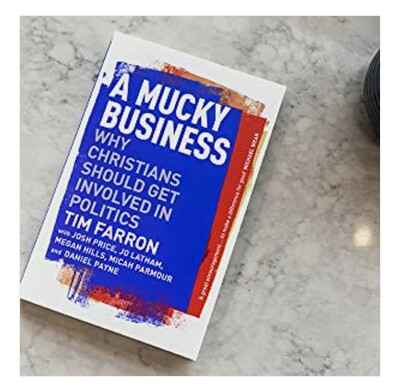 Fellowship is everything. Your relationship with God is the most important thing and the next most important thing is fellowship with others. Be open and be truthful. You do not need to always blurt everything in your head out, but nevertheless, let people know where you are coming from.
Fellowship is everything. Your relationship with God is the most important thing and the next most important thing is fellowship with others. Be open and be truthful. You do not need to always blurt everything in your head out, but nevertheless, let people know where you are coming from.
If they decide that you are not to become an MP, party president, or lead because of what they know about you, that is how it is meant to be. Be a little bit less ambitious for yourself and a bit more ambitious for the gospel.
A Mucky Business: Why Christians Should Get Involved in Politics
Tim Farron (with Josh Price, Jo Latham, Megan Hills, Micah Parmour and Daniel Payne
IVP
ISBN 978 1 789 444 6
£12.99
192 pages


